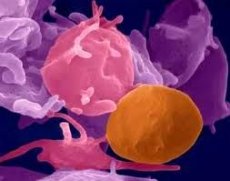Medical expert of the article
New publications
Scientists from Germany have discovered a new, previously unknown function of platelets
Last reviewed: 01.07.2025

All iLive content is medically reviewed or fact checked to ensure as much factual accuracy as possible.
We have strict sourcing guidelines and only link to reputable media sites, academic research institutions and, whenever possible, medically peer reviewed studies. Note that the numbers in parentheses ([1], [2], etc.) are clickable links to these studies.
If you feel that any of our content is inaccurate, out-of-date, or otherwise questionable, please select it and press Ctrl + Enter.

Scientists from Germany have managed to discover a new, previously unknown function of platelets. As it turns out, these cells, in addition to participating in the formation of a blood clot, actively participate in the work of the immune system.
The researchers came to this conclusion after observing the organism of mice that had been previously injected with the listeriosis pathogen (Listeria monocytogenes). The scientists saw that after entering the organism, the listeriosis pathogen first contacts platelets, which "stick" to it and transport it to the spleen, where the antigen information is transferred to dendritic cells, forming a full-fledged immune response.
When studying biochemical processes, it turned out that the adhesion of platelets to bacteria occurs with the participation of GPIb receptors, interacting with components of the complement system, in particular with the C3 protein.
When Listeria monocytogenes without the C3 gene was introduced into mice, the platelet response to the antigen invasion was not observed, and other immune cells, macrophages, took part in the attack on the bacteria. However, in this case, scientists did not observe the formation of acquired immunity to listeriosis, since dendritic cells are responsible for this process.
According to German scientists, this discovery can be used to increase the effectiveness of new vaccines.


 [
[